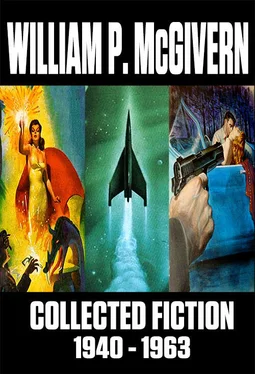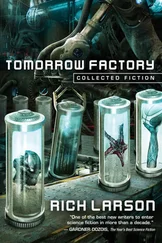Уильям Макгиверн - Collected Fiction - 1940-1963
Здесь есть возможность читать онлайн «Уильям Макгиверн - Collected Fiction - 1940-1963» весь текст электронной книги совершенно бесплатно (целиком полную версию без сокращений). В некоторых случаях можно слушать аудио, скачать через торрент в формате fb2 и присутствует краткое содержание. Год выпуска: 2014, Издательство: Jerry eBooks, Жанр: Ужасы и Мистика, Фантастика и фэнтези, Детектив, Прочие приключения, на английском языке. Описание произведения, (предисловие) а так же отзывы посетителей доступны на портале библиотеки ЛибКат.
- Название:Collected Fiction: 1940-1963
- Автор:
- Издательство:Jerry eBooks
- Жанр:
- Год:2014
- ISBN:нет данных
- Рейтинг книги:3 / 5. Голосов: 1
-
Избранное:Добавить в избранное
- Отзывы:
-
Ваша оценка:
- 60
- 1
- 2
- 3
- 4
- 5
Collected Fiction: 1940-1963: краткое содержание, описание и аннотация
Предлагаем к чтению аннотацию, описание, краткое содержание или предисловие (зависит от того, что написал сам автор книги «Collected Fiction: 1940-1963»). Если вы не нашли необходимую информацию о книге — напишите в комментариях, мы постараемся отыскать её.
Collected Fiction: 1940-1963 — читать онлайн бесплатно полную книгу (весь текст) целиком
Ниже представлен текст книги, разбитый по страницам. Система сохранения места последней прочитанной страницы, позволяет с удобством читать онлайн бесплатно книгу «Collected Fiction: 1940-1963», без необходимости каждый раз заново искать на чём Вы остановились. Поставьте закладку, и сможете в любой момент перейти на страницу, на которой закончили чтение.
Интервал:
Закладка:
He had no clear idea of what he was going to do, but he knew that he must recover the bond before Mercer passed it on to his slinky accomplice, Celeste.
If he failed he would be branded forever as a thief and a criminal. With this thought bolstering his courage, Oscar crept down the corridor toward the door, beyond which lay freedom. His destination — the bank employee’s dance at the Grande Arms Hotel.
Oscar hesitated in the lobby of the Grande Arms Hotel, his determination wavering in the face of its imposing splendor and dignity. Throngs of formally attired couples surged past him, their faces mirroring the anticipated delights of the gala evening. From the ballroom adjoining the lobby, the strains of smooth, sophisticated music could be heard, inviting the revelers to romance and gaiety.
Everyone but the nervous, invisible figure crouched forlornly in the middle of the lobby was unhappy.
Oscar recognized with envy his fellow employees sauntering through the lobby, their dates clinging to their arms, drinking in the pearls of wisdom that dropped glibly from masculine lips. Oscar even had a glimpse of Phineas Botts, resplendent in white tie and topper, striding through the lobby, waving genially to his employees.
Botts’ wife, a sharp-looking, middle-aged woman, who somehow gave the impression of being freshly lacquered, marched beside him, obviously proud of her position.
“There goes Mrs. Astor’s horse,” Oscar heard an underpaid clerk snicker.
“Looks to me like she’s been having too many oats,” his girl friend agreed in a stage whisper.
Oscar was mildly horrified at such impertinence, but there was nothing he could say about it at the moment. His invisibility was the important thing now. Besides, Mrs. Botts did look somewhat overstuffed. Oscar wondered vaguely if she wouldn’t be useful at a picnic where there weren’t any benches around to sit on...
He saw something then that made him forget his thoughts, jerked him to attention.
Through the arched doorway that led to the ballroom, Oscar saw Lester Mercer whispering to Celeste, saw him hand her something quickly, surreptitiously.
He was too late!
The horrible thought burst upon him, blowing away his caution like a straw in a gale. He ran toward the ballroom, toward Mercer and Celeste, leaving a breeze in his wake that rustled the taffeta skirts he passed.
When Oscar entered the brilliantly lighted ballroom, Mercer and Celeste were separating, walking off in opposite directions. Oscar wavered, torn by indecision. Which one to follow? He hesitated frantically until he remembered that Mercer had slipped something to Celeste. What else could it have been but the bond? Even as this thought came to him he was hurrying excitedly after Celeste.
The rambunctious brunette was dressed — or rather undressed — in a breathtaking number of flaming red as easy to distinguish in the crowd as a lighted torch. Oscar followed, hope blazing in his heart, until he realized with paralyzing, icy horror that Celeste was headed toward a cream-colored door, which was opening and closing continually as women streamed in and out.
His stricken eyes read the neat sign lettered on the paneling — Women’s Powder Room.
Oscar stopped, aghast. He realized despairingly that he was beaten, for Celeste’s red dress had already disappeared into those sacred precints.
The mere thought of following her turned his blood to a stream of ice water, started him trembling uncontrollably. Miserably he hovered about the entrance to the powder room. He would have to wait.
But what if Celeste passed the bond on to another conspirator — one whom Oscar didn’t know — and that party left the dance? His last chance would be gone. The thought fired him with a frenzied, desperate courage. He must follow Celeste beyond these portals of doom.
He moved closer to the door, his heart thumping against his ribs. The door opened suddenly as two women emerged. Oscar’s chance had arrived. He took a step — and then his courage melted like ice on an August day. He couldn’t do it. His spirit quailed and his brow became feverish at the mere thought of invading that sanctum of inviolate femininity.
But underneath Oscar’s timid exterior lay stern, gritty stuff.
It rallied to his aid now, forced his unwilling feet to carry him to the door, to wait another chance.
It came almost immediately. The sacred portals swung open, displaying long mirrors, cushioned benches and women, women by the dozen. Oscar took a deep breath and shuffled his feet nervously, like a sprinter preparing for the hundred yard dash.
“May the best man win,” he whispered to himself; and then with a slithering motion of his hips, he slipped through the door into the outer lounge of the Chamber of Horrors.
It was a utterly new experience for Oscar Doolittle. He looked about, fearful and uncertain, at the females standing in chattering groups; at the women, young and old seated before the gleaming mirrors, repairing school girl cheeks and droop-chinned features that were anything but romantic.
He spotted the beauteous Celeste instantly. The burnished brunette had just deposited her purse on a long table and was moving with feline grace to an unoccupied seat in front of a mirror.
Oscar’s eyes riveted on the velvet purse, the purse that contained the precious bond, his passport to vindication. He moved cautiously through the scads of women, his eyes centered on the purse. As he circled around the port side of a hefty dowager, his eyes lifted and he saw Ann talking to another girl.
Ann, lovely and beautiful, was wearing a frilly something or other that made her look like a visitor from heaven. Oscar stood still, gazing impassionedly at her while a lump crawled up his throat.
He had lost her. Lost her to that scheming crook, Lester Mercer. A hot flash of anger seared him, redoubling his determination to expose the efficiency expert, prove his own Innocence. He had to, he must, if only for Ann’s sake!
Oscar was close to the purse now, so close that he could reach out and touch it. His trembling fingers felt as clumsy as bananas as he tried to unsnap the tiny silver clasp that guarded the contents of the bag.
Finally it opened — and Oscar’s fluttery fingers probed into the interior, met crisp, smooth paper.
He had succeeded! The thought fired him like a strong elixir. Exultingly he prepared to remove the bond, his brain racing ahead of him with triumphant visions of Mercer’s consternation when the previous paper was returned.
And then his hand began to tremble. Nervelessly it fell from the purse, as his whole being was swamped with stark, icy terror.
“No!” Oscar gasped, “Not here! Not again!”
But this protestations were futile. For in his ears, faintly at first, and then with increasing volume, was booming the sound that heralded his return to visibility.
Oscar gazed about distractedly, panic and hysteria mounting in his breast. He would rather have stalked into a cageful of lions than face these women. Bereft of reason, stunned to the core of his soul, he could only stand helplessly by as his thin body suddenly resumed its normal condition and became visible.
He was not noticed immediately.
A fat matron to his right turned to him.
“Can I borrow your lipstick, dearie?” she asked sociably.
“I don’t use it—” Oscar began, but it was as far as he got.
The woman’s shrill, piercing scream ripped through his words, blitzkrieged through the room, shattering its comparative quiet. Women wheeled about, saw Oscar, and began shrieking. They crowded back from him, their cries of terror crescendoing into an unbelievable clamor as their imaginations began to work overtime.
Oscar threw wide his arms in a gesture of entreaty.
Читать дальшеИнтервал:
Закладка:
Похожие книги на «Collected Fiction: 1940-1963»
Представляем Вашему вниманию похожие книги на «Collected Fiction: 1940-1963» списком для выбора. Мы отобрали схожую по названию и смыслу литературу в надежде предоставить читателям больше вариантов отыскать новые, интересные, ещё непрочитанные произведения.
Обсуждение, отзывы о книге «Collected Fiction: 1940-1963» и просто собственные мнения читателей. Оставьте ваши комментарии, напишите, что Вы думаете о произведении, его смысле или главных героях. Укажите что конкретно понравилось, а что нет, и почему Вы так считаете.

![Уильям Макгиверн - Завтра опять неизвестность [английский и русский параллельные тексты]](/books/35168/uilyam-makgivern-zavtra-opyat-neizvestnost-angli-thumb.webp)









